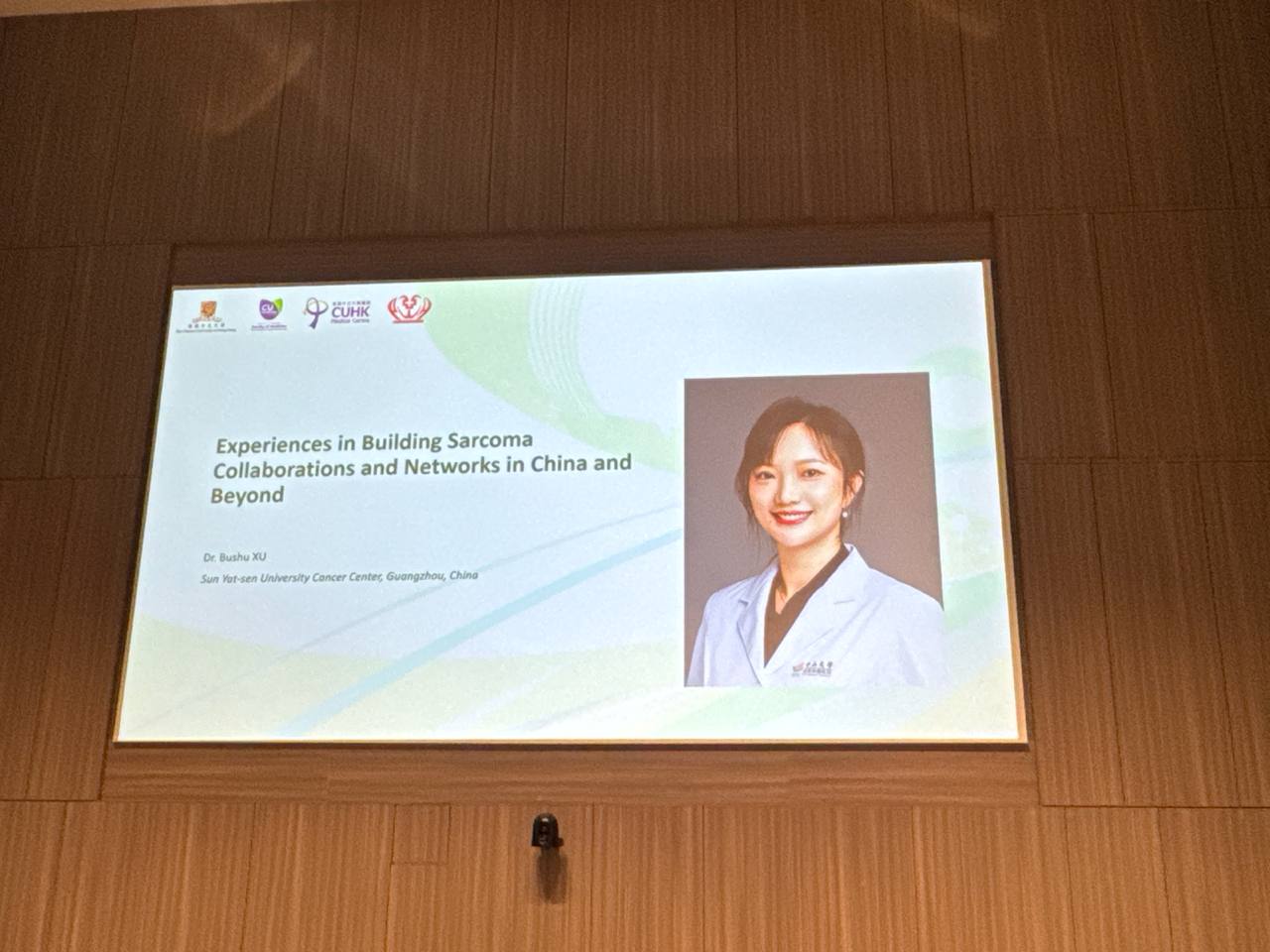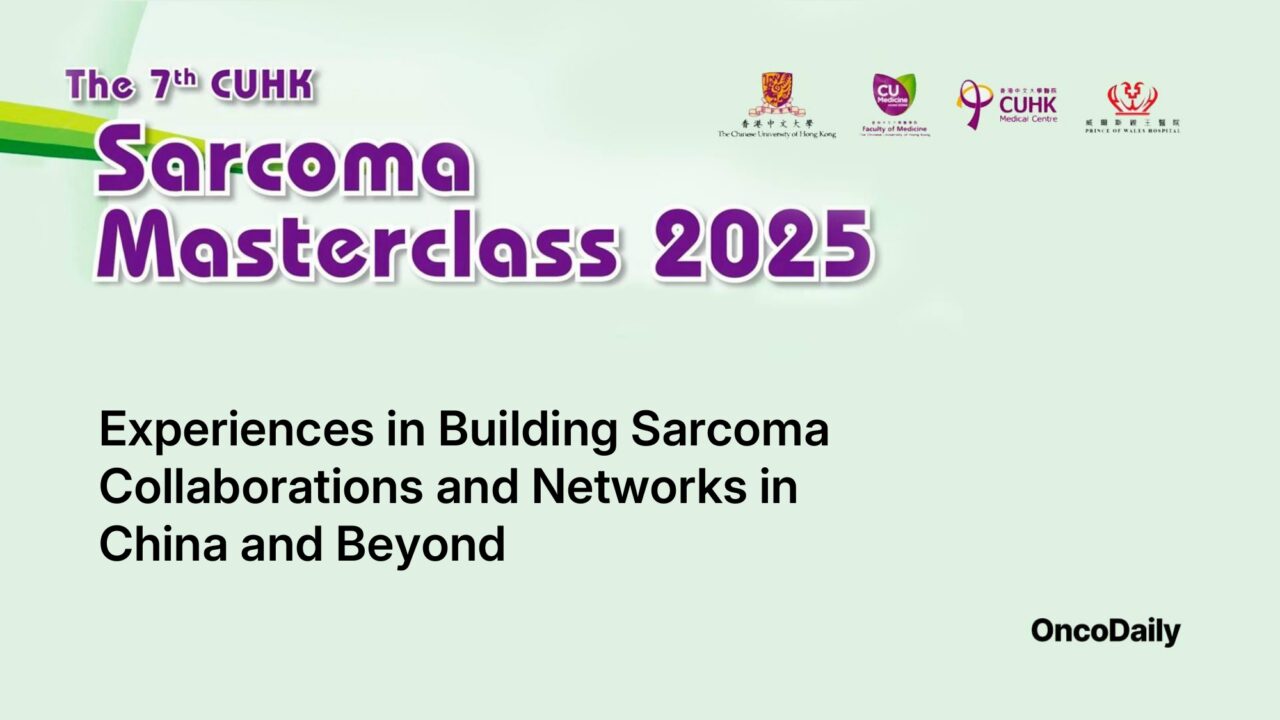Sarcoma collaborations in China were the central theme of Dr. Bushu Xu’s lecture at the CUHK Sarcoma Masterclass 2025. Representing the Sun Yat-sen University Cancer Center (SYSUCC), Dr. Xu highlighted the rapid development of sarcoma networks across the Greater Bay Area and beyond, where regional centers are increasingly linked through shared clinical pathways and research platforms. She emphasized the importance of multidisciplinary teamwork, international partnerships, and collaborative clinical trials in advancing sarcoma care and research.
Drawing on the SYSUCC experience, she noted that coordinated networks not only improve access to expertise for patients but also generate large datasets that are vital for understanding rare subtypes and refining treatment strategies. Her talk also explored novel therapeutic strategies under investigation in China, including PD-1 blockade, HDAC inhibitors, and MDM2/p53 inhibitors, underscoring how collaborative structures can accelerate both translational research and patient outcomes.

Background: The Role of Collaboration in Sarcoma Care
Sarcomas are rare and heterogeneous malignancies that demand highly specialized expertise across pathology, surgery, medical oncology, and radiation oncology. In China, as in many parts of the world, the relative scarcity of cases per center poses significant challenges for both accurate diagnosis and optimal treatment planning. Many community hospitals may encounter only a few sarcoma patients each year, which limits clinical experience and increases the risk of inconsistent management.
Dr. Xu emphasized that collaboration is essential to overcoming these limitations, as it allows for centralized care, pooling of expertise, and the creation of larger patient cohorts that are critical for running meaningful clinical trials. The experience at SYSUCC highlights how structured collaboration can transform outcomes by fostering multidisciplinary decision-making, harmonizing treatment protocols across institutions, and ensuring that patients have access to innovative therapies through trial participation.
These efforts not only improve the quality and consistency of sarcoma care within China but also integrate Chinese patients into the global sarcoma research landscape, helping to accelerate discoveries that benefit patients worldwide.
Sarcoma Collaborations in China
One of Dr. Xu’s main messages was the importance of sarcoma networks within China. SYSUCC has played a leading role in establishing the Greater Bay Area Sarcoma Network, bringing together hospitals, oncologists, pathologists, and surgeons to standardize care pathways. This network model facilitates referrals, ensures access to specialized sarcoma expertise, and increases opportunities for patients to enter clinical trials. Beyond the Greater Bay Area, China is also actively participating in global sarcoma consortia, integrating local experience with international advances.
Clinical Trials and Research Advances
Dr. Xu highlighted the expanding portfolio of clinical trials in sarcoma at SYSUCC and across China. Among the most promising areas are immunotherapy approaches, including PD-1 blockade, which has shown encouraging activity in subsets of sarcoma patients. She also discussed trials of HDAC inhibitors and MDM2/p53 inhibitors, novel agents that target specific molecular vulnerabilities in sarcoma. These efforts reflect a shift toward biology-driven, precision oncology, with collaboration ensuring that sufficient patient numbers can be enrolled to generate meaningful data.
International Collaboration and Future Perspectives
International collaboration was another cornerstone of Dr. Xu’s lecture. She emphasized that rare diseases like sarcoma cannot be advanced by single centers or even single countries in isolation. Partnerships with global sarcoma groups not only expand trial enrollment but also ensure that Chinese patients benefit from cutting-edge therapies developed worldwide. Looking forward, Dr. Xu expressed optimism that collaborative models will accelerate access to novel therapies, improve survival outcomes, and deepen the integration of Chinese sarcoma research into the global oncology community.
Conclusion
Dr. Bushu Xu’s lecture at the CUHK Sarcoma Masterclass 2025 underscored how sarcoma collaborations in China are reshaping both care and research. Through regional networks, participation in international consortia, and a strong focus on clinical trials, SYSUCC and its partners are advancing multidisciplinary care and paving the way for novel therapeutic strategies. These efforts highlight the vital role of collaboration in improving outcomes for patients with this rare and complex group of cancers.
You can read the abstract here.


